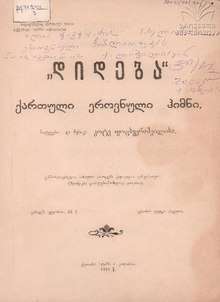Dideba
"Dideba" (Georgian: დიდება, English: "Glory", lit. '"Praise"') was the national anthem of Georgia[1] from November 1990[2] to May 2004. It was previously the national anthem of Georgia from 1918 to 1921.[3]
| English: Praise | |
|---|---|
| დიდება | |
 1918 sheet music of "Dideba" | |
Former national anthem of | |
| Lyrics | Kote Potskhverashvili |
| Music | Kote Potskhverashvili |
| Adopted | 1918 |
| Readopted | November 1990 |
| Relinquished | 1921, 20 May 2004 |
| Succeeded by | "Tavisupleba" |
| Audio sample | |
"Dideba" (instrumental)
| |
| National anthems of Georgia | ||||||||
|---|---|---|---|---|---|---|---|---|
|
||||||||
History
Background
"Dideba" was written and composed by Kote Potskhverashvili and was adopted by the "Menshevik"-led Georgian government as the country's national anthem in 1918 after it became free from Russian rule. However, "Dideba"'s usage in this manner was to be short-lived. It would only used for a few years, until Georgia was invaded, occupied, and forcibly annexed by Russia in 1921 and came under Soviet rule from 1922 onward.
Readoption
After Georgia became free of Soviet rule in the early 1990s, "Dideba" was readopted as the Georgian national anthem, though at the time of its re-adoption it was barely known by most Georgians[2] as it had been almost seven decades since it was last used as the country's national anthem.
Replacement
"Dideba" was used as the Georgian national anthem from November 1990[2] until 20 May 2004, when it was replaced by the current Georgian national anthem "Tavisupleba" following a change in governments.[4] Though the replacement of "Dideba" in 2004 came after a change in governments, preliminary efforts to replace "Dideba" reportedly predated said reforms.[4]
Lyrics
| Georgian | Latin script | IPA transcription | English translation |
|---|---|---|---|
დიდება ზეცით კურთხეულს, |
Dideba zecit k’urtxeuls |
didɛba zɛt͡sʰitʰ kʼurtʰxɛuls |
Praise be to the heavenly Bestower of Blessings, |
References
- "FBIS Report: Soviet Union. Republic affairs". The Service. 25 November 1991 – via Google Books.
- Jones, Stephen (2013). Georgia: A Political History Since Independence. I.B. Tauris. p. xxi. Retrieved 12 January 2019 – via Google Books.
- Mikaberidze, Alexander (6 February 2015). "Historical Dictionary of Georgia". Rowman & Littlefield – via Google Books.
- "Georgia: 1918-1920, 1991-2004". Nationalanthems.info. 2018. Retrieved 12 January 2019.